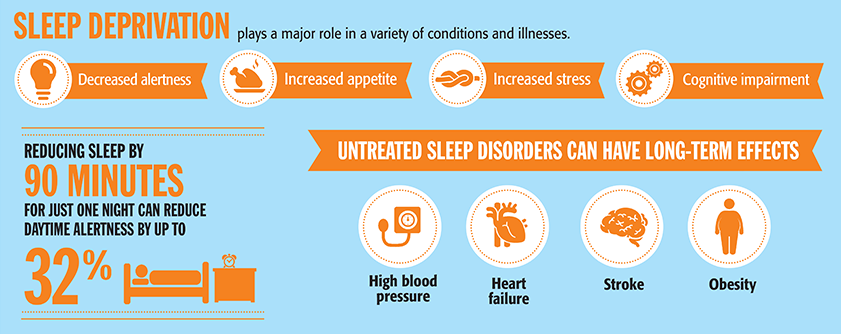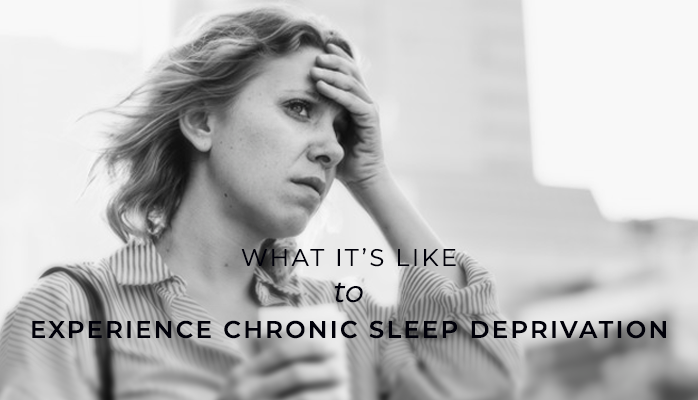What is Sleep Deprivation?
Sleep deprivation is the harsh reality of being deprived of the restorative power of sleep. Chronic sleep deprivation is a prolonged state of not getting enough sleep, lasting for at least a month or more. In contrast, acute sleep deprivation is short-lived and often has a specific cause. Chronic sleep deprivation not only makes life miserable for the individual experiencing it but also has negative consequences for those around them.
Sleep deprivation impacts your performance and health in all areas of life. Furthermore, it can have serious medical consequences, namely:
- Shortened life expectancy
- Much greater risk of disease and medical problems
- Lower quality of life
To avoid sleep deprivation, you need to get enough sleep. This is a somewhat complicated point because:
- We need different sleep at different ages
- Our sleep patterns change as we get older
- You are unique with your own unique sleep patterns
- Our unique sleep patterns change in response to things like seasons, our daily activities, life events, etc.
You need to be aware what your needs are. Sleep deprivation occurs when you are not meeting your sleep-need.
Are You Getting Enough Sleep?
All that being said, it’s good to have a baseline for much sleep you need. Here are common recommendation for how much sleep you should expect to get based on your age [National Sleep Foundation]:
- <1 year: 12-17 hours per day (more sleep for newborns than toddlers)
- 1-2 years: 11-14 hours
- 3-5 years: 10-13 hours
- 6-13 hours: 9-11 hours
- 14-17 hours: 8-10 hours
- 18-65: 7-9 hours
- 65+: 7-8 hours
These are general guidelines. As said earlier, the sleep you need may fall within this range, or it might be a little higher (though virtually all studies show that 7 hours is the minimum).
Also, as we age our sleep patterns change, and we have to accommodate these changes. Usually this entails:
- Going to bed earlier
- Waking up earlier
- Not sleeping as restfully
- Taking daytime naps to meet the sleep-need
What’s the Physical Experience of Chronic Sleep Deprivation?

Chronic sleep deprivation has significant negative consequences on our health as well
Sleep deprivation is uncomfortable physically, and you will likely notice changes in the physical aspects of your life. Generally, you will feel simply sluggish, low energy, and weaker than normal. Here are common descriptors of the physical experience of chronic sleep deprivation:
- Chronic daytime fatigue and lethargy
- Trouble staying awake at the wheel
- Headaches
- Inability to really go work out or play in athletics
- Sudden sleep attacks during the day
- Clinical exhaustion where the body begins to break down (hair falling out, for example)
- Lower performance in athletics
- Quicker exhaustion during work outs
- Trouble maintaining weight
For men, chronic sleep deprivation can be even more impactful. Men replenish testosterone during sleep. Without testosterone, men are at great risk for suffering from erectile dysfunction and further reduced sex drive [see this study which found that in 531 men, patients who slept 4 hours or less had half as much testosterone as patients who sleep 8+ hours].
What’s the Mental Experience of Sleep Deprivation?
The mental experience of chronic sleep deprivation can also be miserable. It can make you feel any or all of the following:
- Inescapable brain fog
- Inability to focus on any one thing
- Inability learn anything new
- Incapable of even remember simple things
- Slower, less efficient, and worse at performing even simple cognitive tasks
If these symptoms are bad enough, people like your boss or teacher/professor will take notice.
What’s the Emotional Experience of Sleep Deprivation?
Getting good sleep plays an important role in emotional management. Chronic sleep deprivation can seriously disrupt your ability to feel joy, manage emotions, and stay emotionally healthy. Chronic sleep deprivation can lead to or worsen:
- Depression
- Chronic anxiety
- Chronic irritability and anger issues, even at trivial things
- Mood troubles
Emotionally, you may be significantly less able to manage setbacks or stress, or react well to emotionally charged situations. A frequent lament for people who have chronic sleep deprivation is, “I just can’t deal with this anymore.”
Treating Sleep Deprivation
As you can see, the experience of chronic sleep deprivation is assaulting on all fronts: emotionally, physically, and cognitively. If you are experiencing it now or have experienced it in the past, you know what we are talking about.
Treating sleep deprivation requires consistent, high quality sleep, potentially for a long period of time. Sleep studies show that getting one or two long nights of sleep does not remove the effects of sleep deprivation.
A few things you can do to maximize your sleep potential:
- Create a calm, relaxing bedroom
- Set a bedtime routine
- Do not use screens (TV, laptop, cellphone) in the hour before bed
- Limit coffee and alcohol consumption
- Keep a sleep diary and look for patterns
If you live in Alaska and are chronically sleep deprived, start the road to a better night’s sleep by taking this free online sleep test.


